Due to a variety of circumstances, there will be no more posts at The Preacher’s Library for the foreseeable future. Thanks for reading.
 The first volume to be published in the new Essentials of Biblical Greek Grammar series is Voice and Mood: A Linguistic Approach, by David L. Mathewson (Baker Academic, 2021). The author is associate professor of New Testament at Denver Seminary. As expected, the book is divided into two parts, voice and mood, each with three chapters, all sandwiched between a brief but valuable introduction and conclusion. The book also contains a bibliography and author, Scripture, and subject indexes. Every part of the book is interesting and informative. The writing is crisp and clear. The highlight of the first part is the discussions of the middle voice, deponency, and the relationship between the middle and passive voices. The highlight of the second part is the discussion of the imperative mood. The author is a master of his subject. The book is essential for serious study of the Greek voices and moods, and serves as a corrective to erroneous and incomplete information found in older grammars of New Testament Greek.
The first volume to be published in the new Essentials of Biblical Greek Grammar series is Voice and Mood: A Linguistic Approach, by David L. Mathewson (Baker Academic, 2021). The author is associate professor of New Testament at Denver Seminary. As expected, the book is divided into two parts, voice and mood, each with three chapters, all sandwiched between a brief but valuable introduction and conclusion. The book also contains a bibliography and author, Scripture, and subject indexes. Every part of the book is interesting and informative. The writing is crisp and clear. The highlight of the first part is the discussions of the middle voice, deponency, and the relationship between the middle and passive voices. The highlight of the second part is the discussion of the imperative mood. The author is a master of his subject. The book is essential for serious study of the Greek voices and moods, and serves as a corrective to erroneous and incomplete information found in older grammars of New Testament Greek.
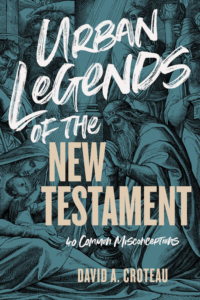 Surely the Bible is the most misinterpreted book, and even Christians are not immune from misconstruing and misunderstanding many passages. This is why I like this series on urban legends from B&H Academic. In Urban Legends of the New Testament (2015), David Croteau, surveys forty of the most commonly misinterpreted passages in the New Testament. In Urban Legends of the Old Testament (2019), David Croteau and Gary Yates
Surely the Bible is the most misinterpreted book, and even Christians are not immune from misconstruing and misunderstanding many passages. This is why I like this series on urban legends from B&H Academic. In Urban Legends of the New Testament (2015), David Croteau, surveys forty of the most commonly misinterpreted passages in the New Testament. In Urban Legends of the Old Testament (2019), David Croteau and Gary Yates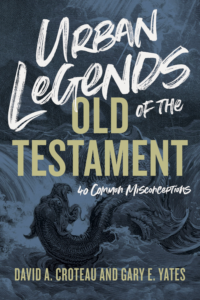 survey forty of the most commonly misinterpreted passages in the Old Testament. Each legendary teaching is introduced with a Bible verse and a paragraph followed by several pages of unraveling (NT) or countering (OT) the legend. Each brief chapter concludes with an application and an annotated bibliography. I like the format of these volumes even if I don’t like all of the authors’ explanations, and
survey forty of the most commonly misinterpreted passages in the Old Testament. Each legendary teaching is introduced with a Bible verse and a paragraph followed by several pages of unraveling (NT) or countering (OT) the legend. Each brief chapter concludes with an application and an annotated bibliography. I like the format of these volumes even if I don’t like all of the authors’ explanations, and
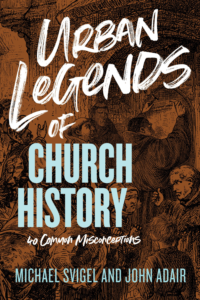 I certainly don’t. The newest volume (2020) in the series is Urban Legends of Church History. It surveys forty of the most commonly misunderstood events of church history, from the period of the early church through the modern age. I recommend these books, with some reservations, of course, and look forward to more volumes in the series.
I certainly don’t. The newest volume (2020) in the series is Urban Legends of Church History. It surveys forty of the most commonly misunderstood events of church history, from the period of the early church through the modern age. I recommend these books, with some reservations, of course, and look forward to more volumes in the series.
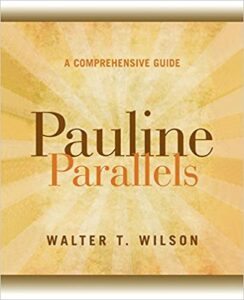 If you come across a cheap copy of Pauline Parallels by Fred Francis and J. Paul Sampley (Fortress Press, first ed., 1975, second ed. 1984), don’t buy it. Because the authors didn’t believe that Paul actually wrote thirteen epistles, they presented just ten of Paul’s epistles with relevant passages from elsewhere in the Pauline corpus. A much better choice is Pauline Parallels: A Comprehensive Guide (Westminster John Knox Press, 2009), by Walter T. Wilson, who should not be confused with the Christian writer and medical doctor Walter L. Wilson (1881-1969). The newer and better work, which “builds on the success of Francis and Sampley’s fine work” (p. ix), covers all thirteen of Paul’s epistles. The text used is the NASB. Yes, it is not King James, but is a better than the RSV of the Francis Sampley editions.
If you come across a cheap copy of Pauline Parallels by Fred Francis and J. Paul Sampley (Fortress Press, first ed., 1975, second ed. 1984), don’t buy it. Because the authors didn’t believe that Paul actually wrote thirteen epistles, they presented just ten of Paul’s epistles with relevant passages from elsewhere in the Pauline corpus. A much better choice is Pauline Parallels: A Comprehensive Guide (Westminster John Knox Press, 2009), by Walter T. Wilson, who should not be confused with the Christian writer and medical doctor Walter L. Wilson (1881-1969). The newer and better work, which “builds on the success of Francis and Sampley’s fine work” (p. ix), covers all thirteen of Paul’s epistles. The text used is the NASB. Yes, it is not King James, but is a better than the RSV of the Francis Sampley editions.
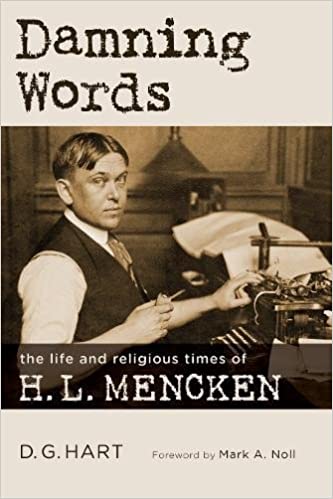
If you are a fan of the journalist, editor, and literary and social critic H. L. Mencken (1880-1956), then D. G. Hart’s Damning Words: The Life and Religious Times of H. L. Mencken (Eerdmans, 2016) is the book for you. The book is part of the Library of Religious Biography series. Mencken was the most influential journalist of the first half of the 20th century, and one of its most quotable personalities. Wit and satire were two of his formidable weapons. Some of his most memorable quotes are:
The whole aim of practical politics is to keep the populace alarmed (and hence clamorous to be led to safety) by menacing it with an endless series of hobgoblins, all of them imaginary.
The most dangerous man to any government is the man who is able to think things out for himself, without regard to the prevailing superstitions and taboos. Almost inevitably he comes to the conclusion that the government he lives under is dishonest, insane and intolerable.
My personal favorite is: “Puritanism—The haunting fear that someone, somewhere, may be happy.” I initially read this book just for the joy of reading a book without having to write a book review or study anything. I don’t get to do this often. I did reference the book, however, when I wrote an article in 2018 titled “Mencken’s Plan, Read’s Rule” for the journal Future of Freedom, and for my forthcoming article in the same journal titled “Puritanism Then and Now.”
By free books I mean PDF copies of old, rare, and out of print books that are out of copyright, and even recent books. Now, there is no substitute for an actual book that you can hold in your hands. I have thousands of them. However, sometimes it is not possible to find a copy of a book that you can afford or the book is simply not available anywhere. There are also occasions when you just may want to check something in a book but don’t want to have to buy it just to do that.
For books out of copyright, my first choice to obtain a PDF is Google Books and my second choice is Internet Archive. They have many of the same books, but sometimes you will only be able to download a PDF from one site. If no PDF is available for download and you just want to check something in a book, you can sometimes search for the information you are looking for and view the page it is on. For some books that are still in copyright, Internet Archive will allow you to digitally check out the book to read it online or look up what you need in it. You can sometimes find downloadable PDFs of recent books at Z-Library. This is great when you need to look up something in an expensive book that you would never buy.
The question of where to buy books needs two answers depending on whether we are talking about new books or used books. New books can be purchased directly from publishers’ websites, from Christian bookstores, from online Christian sources, and, of course, from Amazon. Used books can be purchased from secular and Christian used bookstores, thrift stores, online booksellers, and miscellaneous sources.
New Books
Most publishers will allow you to purchase books directly from their websites. However, this is normally not a wise decision. You will generally have to pay the full list price. Sometimes a small discount will be offered. Either way, you will have to pay the shipping cost, which will be at least $5 on one book. It is good to research books on publisher websites because extended descriptions, excerpts, and the table of contents are usually provided. Just don’t buy books there unless you can’t get the book anywhere else. It is getting harder and harder to find a Christian bookstore that sells anything worth buying. Much of what they sell is not even books, and the books they do sell are mostly fiction or junk. A bookstore attached to a Christian college is a better choice if you are fortunate enough to live near one. But like publishers’ websites, expect to pay full list price. There are some online Christian sources where you can purchase new books at a discount. Most notably is Christianbook, which can be reached at christianbook.com or 1-800-CHRISTIAN. This used to be called Christian Book Distributors (CBD). For years CBD or Christianbook sold several of my books, but then in 2020 abruptly decided to cut ties with some of their smaller vendors without telling them. Amazon is generally your best bet for new books, especially if you know exactly what you want.
Used Books
Used Christian books can be found at both secular and Christian used bookstores. The latter sometimes also has a small selection of new Christian books. I frequent Brightlight Books in Fern Park, Florida, which also has an overstock warehouse down the street and a store inside Reformed Theological Seminary in Oviedo, Florida. The main store has about an even mix of secular and religious books, mostly used. The seminary store has mainly religious books, mostly used. Thrift stores like Goodwill sometimes have religious books. In the days before the Internet, I used to get monthly lists of used books for sale from book dealers, and then would frantically call them to reserve the books I wanted before they were sold to someone else. Now, as we know, everything is online. Two of the best online marketplaces for used books from a wide variety of dealers are Alibris (alibris.com) and AbeBooks (abebooks.com). Their listings will also include used books offered for sale through Amazon. Miscellaneous sources for used books include garage sales, retiring preachers, and library sales.
Thanks for visiting The Preacher’s Library. This site has been in the works for a very long time. All posts are by Laurence M. Vance.
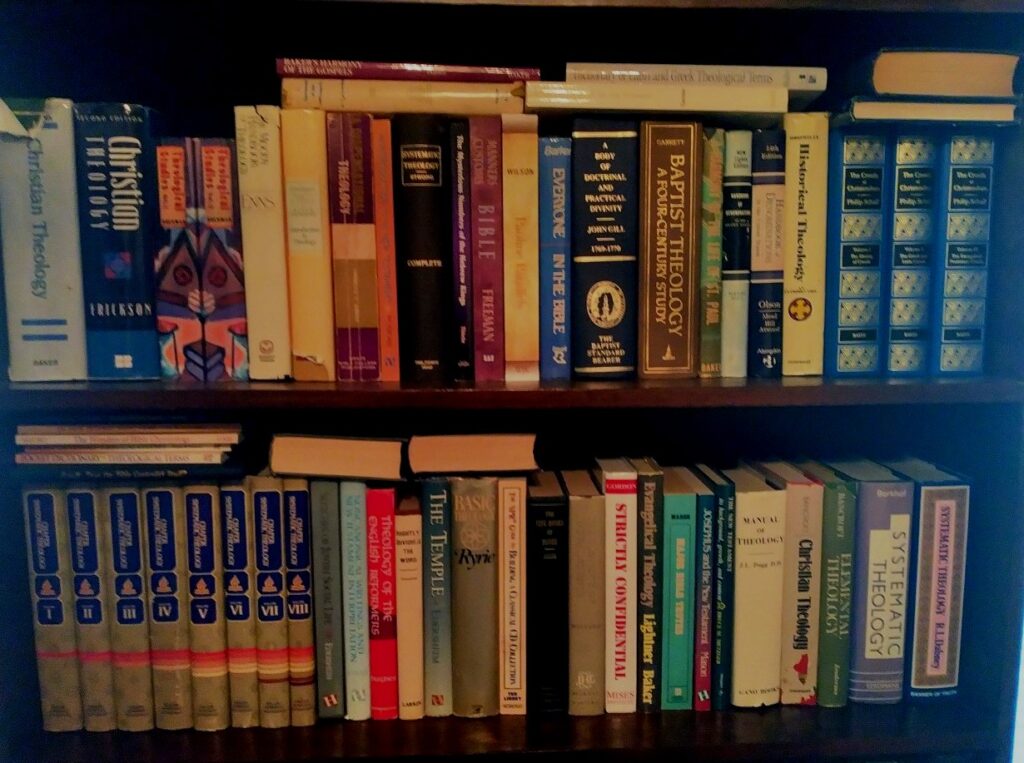
I encourage you to begin by reading the About TPL and About LmV information. The titles, authors, and publishers links in the menu will eventually contain an A-Z list by title, author, and publisher of all books mentioned on this site aside from my own. Reviews by LmV contains a list of all of the publishers of the books I have reviewed, all of the publications where my reviews have appeared, and, eventually, an A-Z list by title of all books I have reviewed going back about 25 years. Books by LmV contains a list of the 35 books I have written and published as well as a link to my business website, vancepublications.com. The Contact page is just what you would expect. The Donate page is self-evident, but explains why it is there.